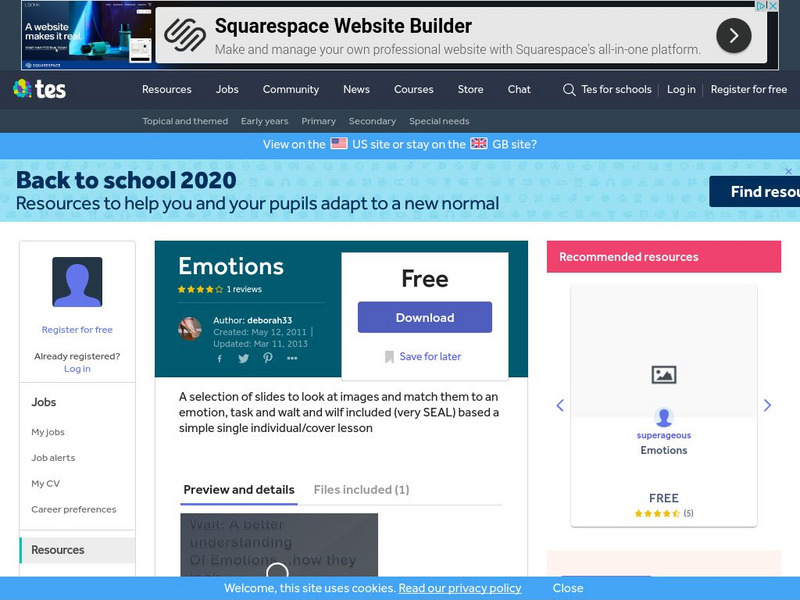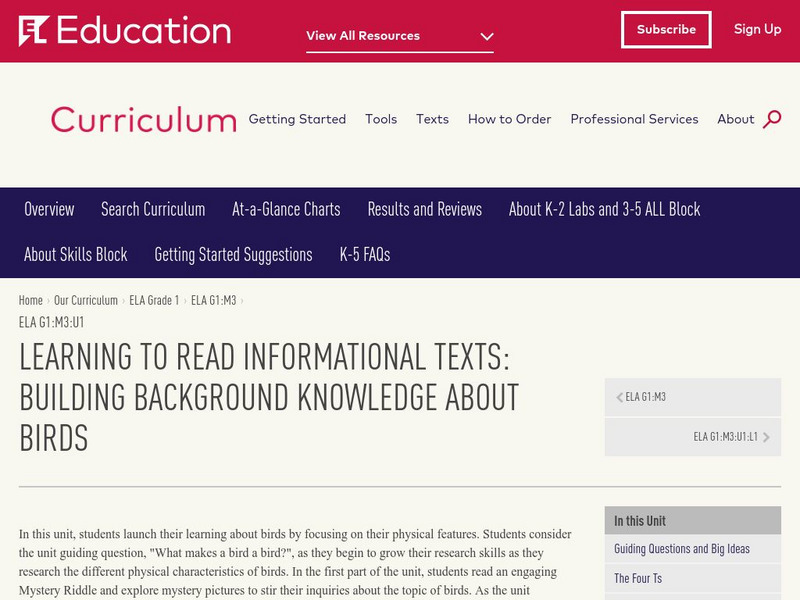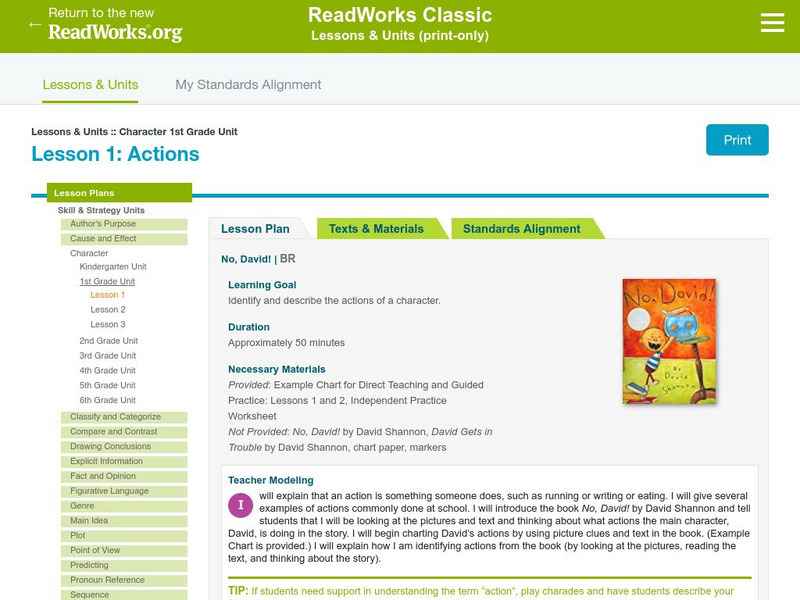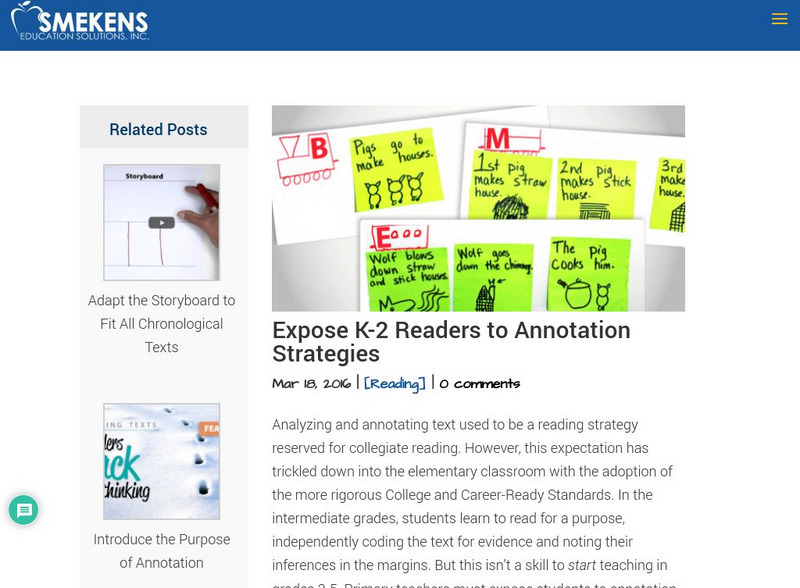ReadWriteThink
Read Write Think: Draw a Story: Stepping From Pictures to Writing
Help young young scholars move from drawing pictures into writing simple stories. Good plan for having students put pictures in sequential order and teaching them about sequential order.
PBS
Pbs Teachers: Story Writing With Arthur
This series of 12 downloadable activities teach students some basics of story writing, using books or videos from the PBS "Arthur" series as a springboard. Activities include creating story maps, asking questions about characters and...
TES Global
Tes: Emotions
[Free Registration/Login Required] This PowerPoint presentation contains art pieces that deal with different emotions. Students will analyze the art pieces and the associated emotions.
Read Works
Read Works: Passages:
[Free Registration/Login Required] Students read a fiction text about a little girl named Jen who got a surprise message from her grandma and answer questions about comprehension, main idea, and inferences. Links to a paired text and...
Better Lesson
Better Lesson: Plant Life Cycle Introduction
Sequencing is an important skill for kindergarten students. This lesson uses nonfiction texts to allow students to make a real-life connection to the skill of sequencing and learn about the plant cycle at the same time! Included are...
Better Lesson
Better Lesson: Describing a Memory
Learners will be able to use a combination of drawing, dictating, or writing to narrate a single event and provide a reaction to what happened. This instructional activity centers around the book "The Song and Dance Man", a great...
Better Lesson
Better Lesson: Comparing and Contrasting With "Then and Now"
This lesson is a great small group reading lesson that has a social studies connection. In this lesson, students will be comparing and contrasting schools from long ago and schools of today using informational texts. Included are...
EL Education
El Education: Learning to Read Informational Texts: Building Background
In this comprehensive unit, students launch their learning about birds by using informational texts. As students read these texts, they build background knowledge and develop their skills as readers of informational texts. Included are...
Better Lesson
Better Lesson: Similarities and Differences Between Two Text
In this lesson plan, through guided practice, the students use two texts about Martin Luther King to compare the similarities and differences between those texts. Includes videos of the lesson plan in action, printable charts, and a...
CPALMS
Cpalms: What Do You Do With a Tail Like This?
[Free Registration/Login Required] In this activity, students will use What Do You Do With A Tail Like This? by Steve Jenkins and Robin Page to identify the main topic and key details using the illustrations and text. Students will work...
Read Works
Read Works: Lesson 1: Actions
In this resource, students will practice identifying and describing the actions of a character. Teachers will model these skills through the use of text and pictures from the story No, David! by David Shannon. Students will then draw a...
Better Lesson
Better Lesson: Speaking and Listening: Collaborative Conversations
Students will partner read The Kite, by Alma Flor Ada. Then work together in small collaborative groups to describe the character of the mother, the children, or the kitten. Included in this lesson are video demonstrations, printable...
Better Lesson
Better Lesson: Text Feature Diagrams
At the end of this lesson, students will be able to identify and create diagrams associated with informational text. Included is a link to an eSpark video on diagrams, rules for group work, multiple examples of diagrams, and a...
Better Lesson
Better Lesson: Comparing & Contrasting Inventors
What do inventors have that are alike? How are they different? Why do they invent? Learning about them may inspire you to invent new technology! In this lesson, students will compare and contrast key details in two texts on the topic of...
CPALMS
Cpalms: Compare/contrast Life Cycle Texts
[Free Registration/Login Required] Students will learn to compare and contrast texts about life cycles using a Venn diagram. Then, using the Venn diagram, students will write an expository paragraph including an introductory sentence,...
Other
Smekens Educational Solutions: Expose K 2 Readers to Annotation Strategies
This article discusses how to begin teaching students in K-2 to record their ideas about text using highlighters, colored pens, large graphic organizers, and sticky notes. Students can retell a story with a storyboard, use a web to find...
Writing Fix
Writing Fix: The Wacky "I Will Not" Chalkboard
Students can use this writing idea from the book Wacky We-Search Reports by Barry Lane to demonstrate understanding in any content area. Students use the idea of writing "I will not " sentences to show their knowledge of various...
Curated OER
Mc Graw Hill: Major Events
Learn how writers use details to describe major events in a story.
Quia
Quia: Literary Terms Quiz
In this self-scoring practice activity, students read four passages and select the main idea of each.
ReadWriteThink
Read Write Think: Exploring Before, During, After Sequencing
From Read-Write-Think, here is a three-day lesson plan in which a class collaborates to produce a book, focusing on carving a jack-o-lantern. The emphasis is on teaching the skill of sequencing events.
Houghton Mifflin Harcourt
Harcourt: School Publishers: Test Tutor: Sequence
Students will increase their reading comprehension skills and understanding of story sequence by reading a passage of text and then answering questions about the order of events.
ReadWriteThink
Read Write Think: Diagram It! Identifying, Comparing & Writing About Non Fiction
Introduce your students to the different types of non-fiction such as biographies, biographies, and informative books. Students will use graphic organizers, peer interaction, and hands-on experiences to further understanding of this lesson.
Read Works
Read Works: Setting Kindergarten Unit: Where and When
[Free Registration/Login Required] Based on Knuffle Bunny by Mo Willems, a lesson plan in which students learn how to utilize text and picture clues to determine a when and where the story takes place.
Utah Education Network
Uen: 1st Grade Act. 24: Interactive Writing
In this lesson, students will listen to nonfiction books about items that sink and float. Students will participate in filling in words to fill in a teacher-created chart that is connected to the information. Students will then write a...

























